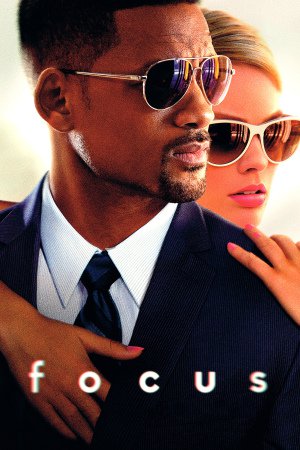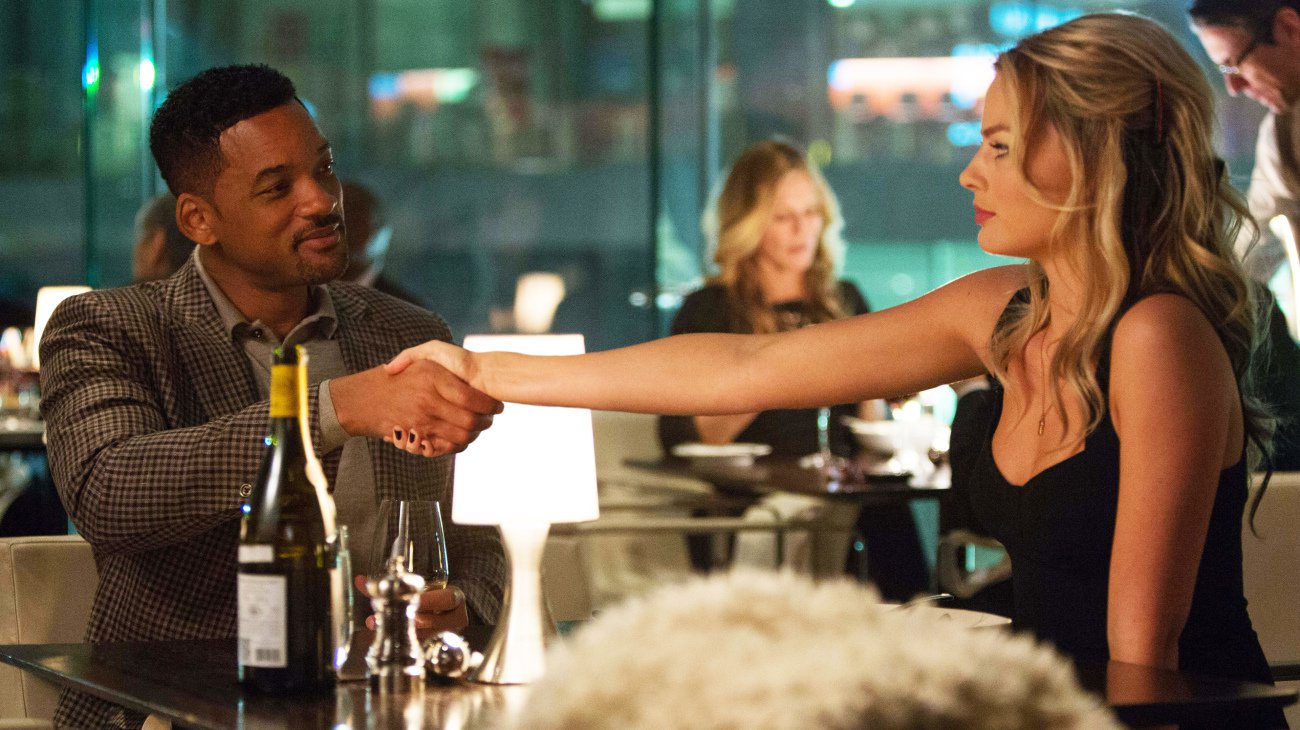
Love in the time of con
Having thought about it for a couple of days now, I still haven't decided if Focus is particularly enjoyable and solidly-crafted for a bad movie, or if it's extremely inconsistent and frustrating for a good movie. I think I ultimately tend towards the latter, if only because no project that depends so successfully on movie star charisma to drive its everything can be truthfully called bad, not in these benighted days when our movie stars are abandoning us. And it is fair to point out that only one-half of the leads of Focus can rightfully be called a "movie star" - Will Smith, making his first movie for adults in seven years - Margot Robbie absolutely throws off the kind of casual, gorgeous, screen-grabbing performance that would immediately confirm her as a movie star if that's still the way things worked.
Smith plays Nicky Spurgeon, a legend in the world of con artists; Robbie plays Jess Barrett, a rank amateur who tries to play him one night in New York, with a sex-based con that she and her partner rush through, and which Nicky has figured out almost the second it starts. This lights enough of a fire under Jess that she chases Nicky to New Orleans, where he's leading a veritable army of grifters and conmen on a spree of pickpocketing and other minor tricks for extracting money from the clueless and ignorant. He takes her under his wing, teaches her the tricks of the trade, all while starting to fall in love with her, and she with him. Ah, but alas! this too is a con, and he's actually only been faking the whole thing so she'll better play her part in the mother of all cons, paying out beautifully for all concerned. And while Jess gets her fair share, the heartbreak isn't worth it. Three years later, their paths cross again in Buenos Aires, as Nicky finds himself selling his skills to a racing team owner, Rafael Garriga (Rodrigo Santoro), who wants to fix a race he's already likely to win. And this is a task the sullen, dead-eyed Nicky is fine to grind through, until he learns that Garriga happens to be Jess's new lover - and it turns out that he wasn't faking things with her after all, since having her thrust back into his life proves to throw him wildly off his game.
It's nice when things are simple, and the problem with Focus is such a thing: the first half of the film, in New Orleans, is delightful. The second half, in Buenos Aires, isn't. Not that the first half is flawless, any more than the second half is a wall-to-wall disaster, but the fact remains that Focus is basically two entirely self-contained movies wedged together, and rebooting into the second causes no end of problems for the filmmakers Glenn Ficarra & John Requa (who both write and direct). For one thing, the first half is told basically through Jess's perspective, while the second is through Nicky's; that's the kind of structural fancy-dancing that could easily result in a compelling mash-up of perspectives, but it's not what Focus is interested in, and the result is a confusion of focal points and anchors for the audience that leaves the film struggling to pick back up. It's easy to see what the film is aiming for, especially as it heads into its final twist, and the parallels between the halves start to strengthen themselves; it just doesn't get to where it wants to go.
The other big problem is almost as simple, though not quite as explicable. The best parts of the film, almost indisputably, I'm tempted to say, are those which center on the art of the con; when it is more concerned with the relationship between Nicky and Jess, it deflates badly (this is another reason why the second half is so much weaker than the first; the con involved with the race car trickery is not, to begin with, anywhere near as delightful in its complexity as the final reveals, or as the first half's litany of well-executed grifts). It's honestly kind of bizarre that this should be the case, since the film so persuasively argues that executing cons is how these two characters flirt, and the relaxed sexual chemistry between Robbie and Smith is certainly the strongest individual element in the film. But it only works when it's sublimated underneath sleek style and smooth patter; every time the film turns to focus on the flirting, sexiness, and attraction without filtering it, everything goes to hell. Part of this maybe can be blamed on Smith, who lets things get too serious (Robbie does a good job of keeping even the bleakest moments she has to play fizzy and tossed-off). Mostly, I suspect it's just that the film's lithe style works better when it stays at the level of shallow fun, and that Ficarra & Requa have a hard time recalibrating for actual emotions.
That all being true, when Focus works, it's absolutely splendid, a sugary sweet cocktail of glossy cinematography and editing that make all of the mechanics of conning hum and whir with expert cleanliness, while showing off the stars to absolute best effect. The pleasures of a movie that's willing to bask in having pretty people thrown up onto a huge screen should not be denied, and when those pretty people are so able to tap into the exact tonal register the film needs - in this case, peppy and confident dialogue mixed with a constant unspoken "I know more than you do and I am not going to rest till I prove it" tension that adds some quiet antagonism to the flirting - it can be an outright boon. The razzle-dazzle elements of Focus are terrific, and they exude a breezy refusal to be too serious that makes it easy to enjoy the small spectacle of watching professionals execute reasonably simple tasks flawlessly. A description that applies to the filmmakers and cast as much as to it does to the characters. The film bogs down, certainly, and it bogs down in some very damaging places. But it soars just enough to be, on balance, an enjoyable bit of fluff.
Smith plays Nicky Spurgeon, a legend in the world of con artists; Robbie plays Jess Barrett, a rank amateur who tries to play him one night in New York, with a sex-based con that she and her partner rush through, and which Nicky has figured out almost the second it starts. This lights enough of a fire under Jess that she chases Nicky to New Orleans, where he's leading a veritable army of grifters and conmen on a spree of pickpocketing and other minor tricks for extracting money from the clueless and ignorant. He takes her under his wing, teaches her the tricks of the trade, all while starting to fall in love with her, and she with him. Ah, but alas! this too is a con, and he's actually only been faking the whole thing so she'll better play her part in the mother of all cons, paying out beautifully for all concerned. And while Jess gets her fair share, the heartbreak isn't worth it. Three years later, their paths cross again in Buenos Aires, as Nicky finds himself selling his skills to a racing team owner, Rafael Garriga (Rodrigo Santoro), who wants to fix a race he's already likely to win. And this is a task the sullen, dead-eyed Nicky is fine to grind through, until he learns that Garriga happens to be Jess's new lover - and it turns out that he wasn't faking things with her after all, since having her thrust back into his life proves to throw him wildly off his game.
It's nice when things are simple, and the problem with Focus is such a thing: the first half of the film, in New Orleans, is delightful. The second half, in Buenos Aires, isn't. Not that the first half is flawless, any more than the second half is a wall-to-wall disaster, but the fact remains that Focus is basically two entirely self-contained movies wedged together, and rebooting into the second causes no end of problems for the filmmakers Glenn Ficarra & John Requa (who both write and direct). For one thing, the first half is told basically through Jess's perspective, while the second is through Nicky's; that's the kind of structural fancy-dancing that could easily result in a compelling mash-up of perspectives, but it's not what Focus is interested in, and the result is a confusion of focal points and anchors for the audience that leaves the film struggling to pick back up. It's easy to see what the film is aiming for, especially as it heads into its final twist, and the parallels between the halves start to strengthen themselves; it just doesn't get to where it wants to go.
The other big problem is almost as simple, though not quite as explicable. The best parts of the film, almost indisputably, I'm tempted to say, are those which center on the art of the con; when it is more concerned with the relationship between Nicky and Jess, it deflates badly (this is another reason why the second half is so much weaker than the first; the con involved with the race car trickery is not, to begin with, anywhere near as delightful in its complexity as the final reveals, or as the first half's litany of well-executed grifts). It's honestly kind of bizarre that this should be the case, since the film so persuasively argues that executing cons is how these two characters flirt, and the relaxed sexual chemistry between Robbie and Smith is certainly the strongest individual element in the film. But it only works when it's sublimated underneath sleek style and smooth patter; every time the film turns to focus on the flirting, sexiness, and attraction without filtering it, everything goes to hell. Part of this maybe can be blamed on Smith, who lets things get too serious (Robbie does a good job of keeping even the bleakest moments she has to play fizzy and tossed-off). Mostly, I suspect it's just that the film's lithe style works better when it stays at the level of shallow fun, and that Ficarra & Requa have a hard time recalibrating for actual emotions.
That all being true, when Focus works, it's absolutely splendid, a sugary sweet cocktail of glossy cinematography and editing that make all of the mechanics of conning hum and whir with expert cleanliness, while showing off the stars to absolute best effect. The pleasures of a movie that's willing to bask in having pretty people thrown up onto a huge screen should not be denied, and when those pretty people are so able to tap into the exact tonal register the film needs - in this case, peppy and confident dialogue mixed with a constant unspoken "I know more than you do and I am not going to rest till I prove it" tension that adds some quiet antagonism to the flirting - it can be an outright boon. The razzle-dazzle elements of Focus are terrific, and they exude a breezy refusal to be too serious that makes it easy to enjoy the small spectacle of watching professionals execute reasonably simple tasks flawlessly. A description that applies to the filmmakers and cast as much as to it does to the characters. The film bogs down, certainly, and it bogs down in some very damaging places. But it soars just enough to be, on balance, an enjoyable bit of fluff.
Categories: caper films, comedies, love stories, thrillers






